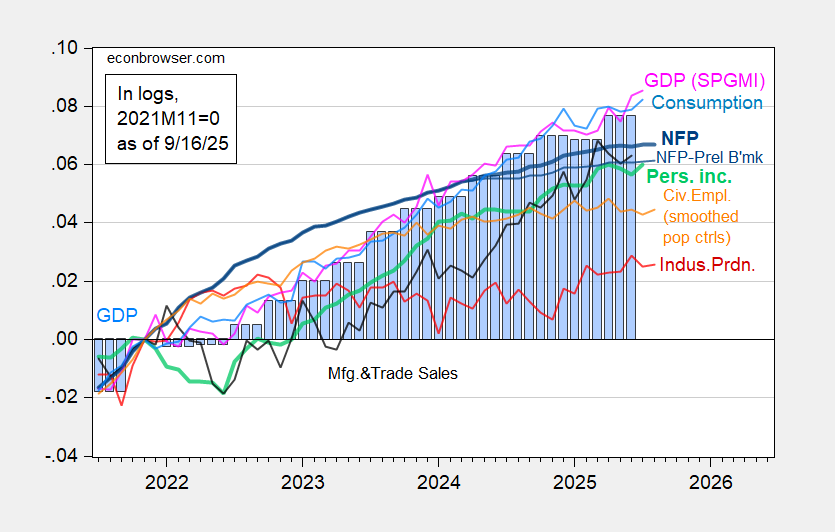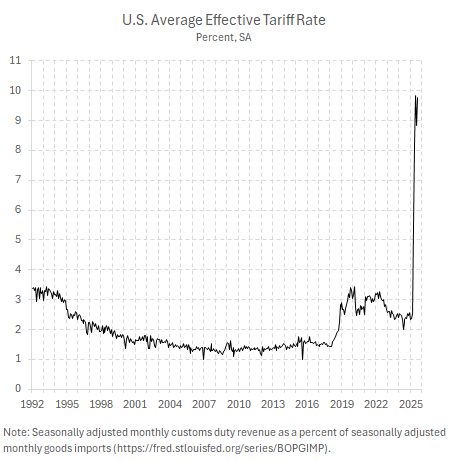
1181. Business Cycle Indicators at Mid-September
Menzie Chinn discusses various economic indicators, including industrial production and retail sales, highlighting trends and comparisons to consensus forecasts.
your daily dose of economic commentary

Menzie Chinn discusses various economic indicators, including industrial production and retail sales, highlighting trends and comparisons to consensus forecasts.

David Folkenflik discusses NPR's plan to cut $5 million from its budget as local public radio stations face financial difficulties.

An argument that measurement tools like CPI and GDP can misrepresent economic realities, leading to misconceptions about inflation and growth, particularly in central planning contexts.
An argument that trade sanctions have increased significantly, affecting global trade, and exploring their economic impacts and political implications on foreign policy.

Bill McBride discusses the decline in imports and exports at LA ports, highlighting trends in container traffic and seasonal patterns affecting trade volumes.

The post highlights various stories illustrating economic principles and their implications, including public sentiment on capitalism and housing market dynamics in NYC.

A landmark $1.5 billion settlement raises crucial questions about copyright, compensation for authors, and the future of AI development amid evolving intellectual property laws.

Paul Krugman discusses Charlie Kirk's political actions and views on gender roles, linking them to broader societal changes and the implications for women in the workforce.

Builder confidence remains steady, but future sales expectations rise due to lower mortgage rates, despite ongoing challenges in the housing market and price reductions by builders.
![[Rerun] Ariel Pakes, Professor and Economist, Harvard University](https://substackcdn.com/image/fetch/$s_!shVZ!,w_1456,c_limit,f_auto,q_auto:good,fl_progressive:steep/https%3A%2F%2Fsubstack-post-media.s3.amazonaws.com%2Fpublic%2Fimages%2Ffa7dc9ca-36ca-456e-b576-92ebc5484002_1792x1024.heic)
The post features a rerun of an interview with a prominent economist, discussing his contributions to economics and personal experiences beyond the field.

Industrial production rose 0.1% in August, with manufacturing output increasing, while capacity utilization remained below the long-term average, reflecting post-pandemic recovery trends.

Retail sales rose 0.6% in August, with a 5.0% increase from the previous year, surpassing expectations and showing revisions in prior months' data.

The Associated Press reports that President Donald Trump has initiated a $15 billion defamation lawsuit against The New York Times and its journalists.

A federal appeals court ruled that Lisa Cook can remain on the Federal Reserve board, preventing her dismissal by President Trump before an important interest rate vote.

Bill McBride discusses upcoming economic data releases, including retail sales, industrial production, and a homebuilder survey, highlighting their potential impact on mortgage rates.

Menzie Chinn discusses the impact of tariffs on Wisconsin's economy, focusing on trade uncertainty and employment data in the manufacturing sector.

The post discusses the impact of new bike lanes on local businesses and assesses their value compared to the costs incurred during installation and lost patronage.

An argument that critiques the sensationalist views on AI safety and superintelligence presented by a prominent columnist, highlighting the lack of evidence and reliance on anecdotal claims.

Rafael Nam discusses President Trump's desire for companies to reduce the frequency of earnings reports and the mixed reactions from executives and financial experts.

Rachel Treisman discusses Stephen Miran's nomination to the Federal Reserve Board and the controversies surrounding his potential impact on the Fed's independence.